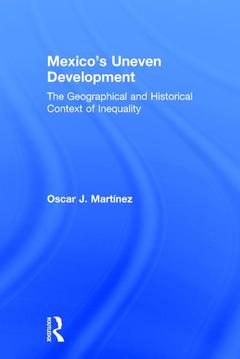Description
Mexico's Uneven Development
The Geographical and Historical Context of Inequality
Author: Martinez Oscar J.
Language: English
Subject for Mexico's Uneven Development:
Keywords
Mexico's Uneven Development; encomiendas; West Germany; Felipe Calderon; Young Men; drug trade; International Monetary Fund; migration; United States; geopolitics; Ruiz Cortines; international trade; Mexico's Foreign Trade; manufacturing; Air Miles; Sierra Madre Oriental; Mexico’s Interior; Mexico’s Economy; Superb; Foundational Factors; Mexico’s Population; Continental United States; Rapid Economic Rise; Mexico’s Gdp; Mexico’s Northern Frontier; Mexican Firms; Los Angeles; Real Gdp; Mexican Middle Class; Mexico’s Exports; Wild Rivers
Approximative price 184.47 €
In Print (Delivery period: 14 days).
Add to cartPublication date: 09-2015
· 15.2x22.9 cm · Hardback
Approximative price 53.83 €
In Print (Delivery period: 14 days).
Add to cartPublication date: 09-2015
· 15.2x22.9 cm · Paperback
Description
/li>Contents
/li>Readership
/li>Biography
/li>
Mexico and the United States may be neighbors, but their economies offer stark contrasts. In Mexico?s Uneven Development: The Geographical and Historical Context of Inequality, Oscar J. Martínez explores Mexico?s history to explain why Mexico remains less developed than the United States. Weaving in stories from his own experiences growing up along the U.S.-Mexico border, Martínez shows how the foundational factors of external relations, the natural environment, the structures of production and governance, natural resources, and population dynamics have all played roles in shaping the Mexican economy. This interesting and thought-provoking study clearly and convincingly explains the issues that affect Mexico's underdevelopment. It will prove invaluable to anyone studying Mexico?s past or interested in its future.
Prologue
Introduction
PART I. THE MEXICO-UNITED STATES DIVIDE
1. Divergent Pathways
2. Affluence and Poverty
PART II. CONTEXT: NATURE AND PEOPLE
3. The Power of Geography
4. Landforms, Transportation, and Cities
5. Mexico’s Fabled "Riches
6. People and the Economic Pie
PART III. CONTEXT: EXTERNAL RELATIONS
7. So Far, So Close
8. Chasing Capital
9. Legal and Illegal Trade
10. Drugs, Liquor, Tobacco, and Migrants
Conclusion: Lessons Learned
Bibliography
Oscar J. Martínez is a Regents' Professor of History at the University of Arizona. His previous books include Troublesome Border and Mexican-Origin People in the United States: A Topical History.




